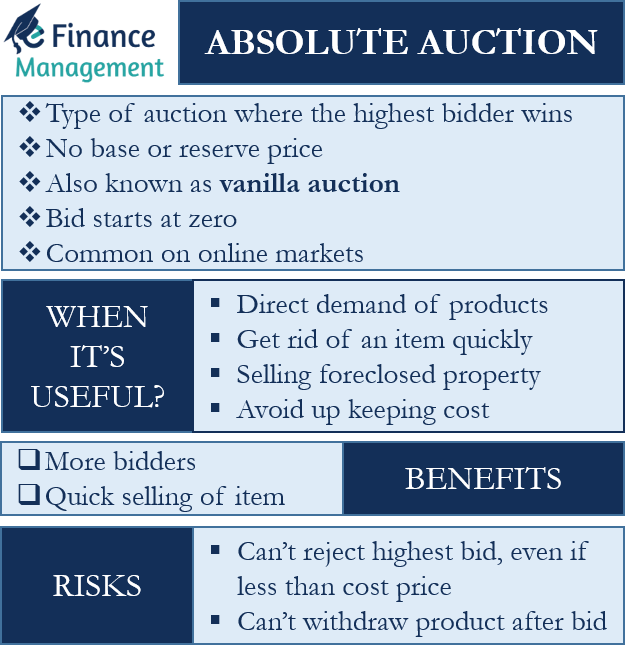What is an Absolute Auction?
An absolute auction is the another most used type of auction where the highest bidder wins, whether that price fulfills the expectations of the bidder. And the bidding price has no relevance to the basic cost or purchase price or any other reference value. This means that such an auction does not have any base or reserve price. Or it does not consider the cost of the goods under auction as any reference. Thus, an entity making the highest bid wins the auction. The absolute price of the items under the auction is $0. We can call such an auction a classic or vanilla auction.
The absence of reserve or base price is what makes absolute auctions different from others. In other auction scenarios, the seller has the option or the right of not accepting the highest bid. Provided the bid quoted is below the reserve price earlier announced or advertised. No such option is available under absolute auction, and the seller has to accept the highest bid.
Each bid starts at zero in an absolute auction, and the entity making the highest bid wins the auction. So, in such an auction, even a very low bid could be sufficient to win the bid when there are not many bidders. Or where the product does not generate enough interest or where the product awareness is low. Such auctions are common on online markets, such as eBay.com.
Absolute Auction: When it’s Useful?
We usually see such types of auctions when there is a direct demand to sell the products. Or, where the entities want to get rid of their items as early as possible like in the case of perishable or out of fashion products, hazardous products, etc. In such cases usually, the carrying cost and chances of devalue/decay are more. Therefore the firms would like to clear off those goods at the best possible prices at the earliest.
Also Read: Auctions
Such a type of auction is also useful for selling foreclosed property. This allows the seller to sell the property quickly, as well as raises the chances for the seller to at least recoup some of the losses on the property as early as possible. Moreover, when a property is lying vacant for a longer period and the cost of managing that property is becoming a burden, such an auction can also assist the property owner in getting rid of the property.
So, it will be appropriate to say that absolute auction is the top choice of sellers when they are not expecting any minimum price for their product. Or, the primary objective of the seller is to get rid of the product quickly and generate whatever revenue is possible. Also, it helps the owner avoid incurring more costs on the upkeep of the property, such as insurance costs, storage costs, and more.

Example
For example, Mr. A buys a new car for $1 million for some business purpose. Just a month later, Mr. A gets a new job but in another market, and thus, wants to get rid of the car quickly. Mr. A holds the live auction and does not set any minimum price that he wants for the car. In this case, the bidding starts at $0.
Benefits and Risks
Since there is no reserve price, such a type of auction generates more bidders and more excitement from the bidders. Another benefit is that it allows the seller to sell the item quickly.
In terms of risk, such an auction has more risk for the seller. This is because the highest bid may be less than the cost price of the item or product under auction. Another disadvantage is that the seller has to accept the highest bid irrespective of the price. Also, the seller can not withdraw the product once an auctioneer asks for the bids.

